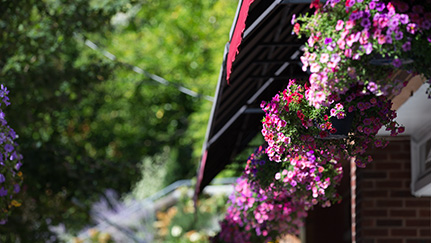
Preventing, spotting and repairing roof damage
Rain, hail, sleet and snow may not stop the U.S. Mail from its appointed rounds but those elements can, over time, stop your roof from doing its job. With the average cost in 2016 of roof repairs over $690 and roof replacements above $7,000, stopping damage before it occurs is a smart idea.
Here are the items you should pay particular attention to when inspecting your roof for damage:
Material failure
Flashing is the metal that connects the chimney, vents and skylights to the roof. Also, it connects porch roofs to the second story. Inspect the flashing every 10 years to ensure it hasn’t corroded or cracked, that rubber gaskets around plumbing vents haven’t deteriorated and that the metal collars on vents used with gas appliances remain tight. Estimated cost of flashing: About $50 per roll.
Check the surface of asphalt shingles to ensure their grains are intact. If they’ve been abraded (by weather or walking on the roof) replace the shingles, then stay off the roof. This is true for cracked tiles, too. Estimated cost: About $30 per bundle, but can vary based on the roof type.
Wind and tree damage
Tree branches that rustle gently in a breeze can also crack tiles, abrade asphalt shingles and damage fascia boards if they brush or strike them. Prevent tree damage by keeping branches at least 10 feet from your home and by ensuring that trees can’t hit your home if they fall during high winds. If a tree hits your home, evacuate until an engineer or general contractor ensures your home is safe to inhabit.
After storms, check your roof for missing shingles, worn spots and cracked or broken tiles. Also, look for broken fascia boards and loose metal sheeting. Estimated cost: DIY prune for free.
Wildlife
Raccoons may be cute, but they can be destructive by ripping off shingles, nesting in attic insulation, compressing it and leaving excrement. Squirrels and roof rats may cause similar problems. Inspect your attic once or twice each year to ensure it’s not home to unwanted wildlife. If critters have invaded, contact a wildlife specialist to remove them, then find and seal their entry points and repair any damaged roofing. Estimated cost of wildlife removal: $200-$500.
Moss
Moss on the roof is more harmful than beautiful. Its spores collect between shingles, growing and spreading to form mats a few inches thick. These mats store rainwater, which wicks underneath shingles, soaks the underlayment and, if unchecked, rots the roof sheathing.
If you have moss, remove it. An air broom works nicely. Don’t power wash the roof, because that can drive water underneath the shingles or tiles. Once the moss is gone, apply a chemical treatment or zinc or copper solution to kill any remaining moss spores. Alternatively, install zinc or copper strips at the roof’s peak to kill moss in the coming decades. When reroofing, consider shingles with built-in moss inhibitors. Estimated cost of chemical spray: About $15.
Caring for your roof helps it last years longer. If it’s damaged by events beyond your control, however, contact your Nationwide insurance agent. Not a Nationwide customer? Learn more about our reliable home insurance coverage options.
Product, coverage, discounts, insurance terms, definitions, and other descriptions are intended for informational purposes only and do not in any way replace or modify the definitions and information contained in your individual insurance contracts, policies, and/or declaration pages from Nationwide-affiliated underwriting companies, which are controlling. Such products, coverages, terms, and discounts may vary by state and exclusions may apply.
The information included here is designed for informational purposes only. It is not legal, tax, financial or any other sort of advice, nor is it a substitute for such advice. The information may not apply to your specific situation. We have tried to make sure the information is accurate, but it could be outdated or even inaccurate in parts. It is the reader’s responsibility to comply with any applicable local, state or federal regulations. Nationwide Mutual Insurance Company, its affiliates and their employees make no warranties about the information nor guarantee of results, and they assume no liability in connection with the information provided. Nationwide and the Nationwide N and Eagle are service marks of Nationwide Mutual Insurance Company. © 2024 Nationwide